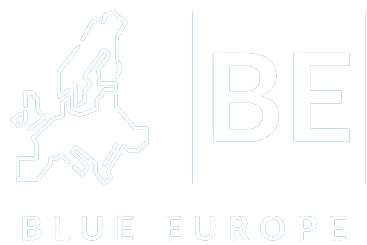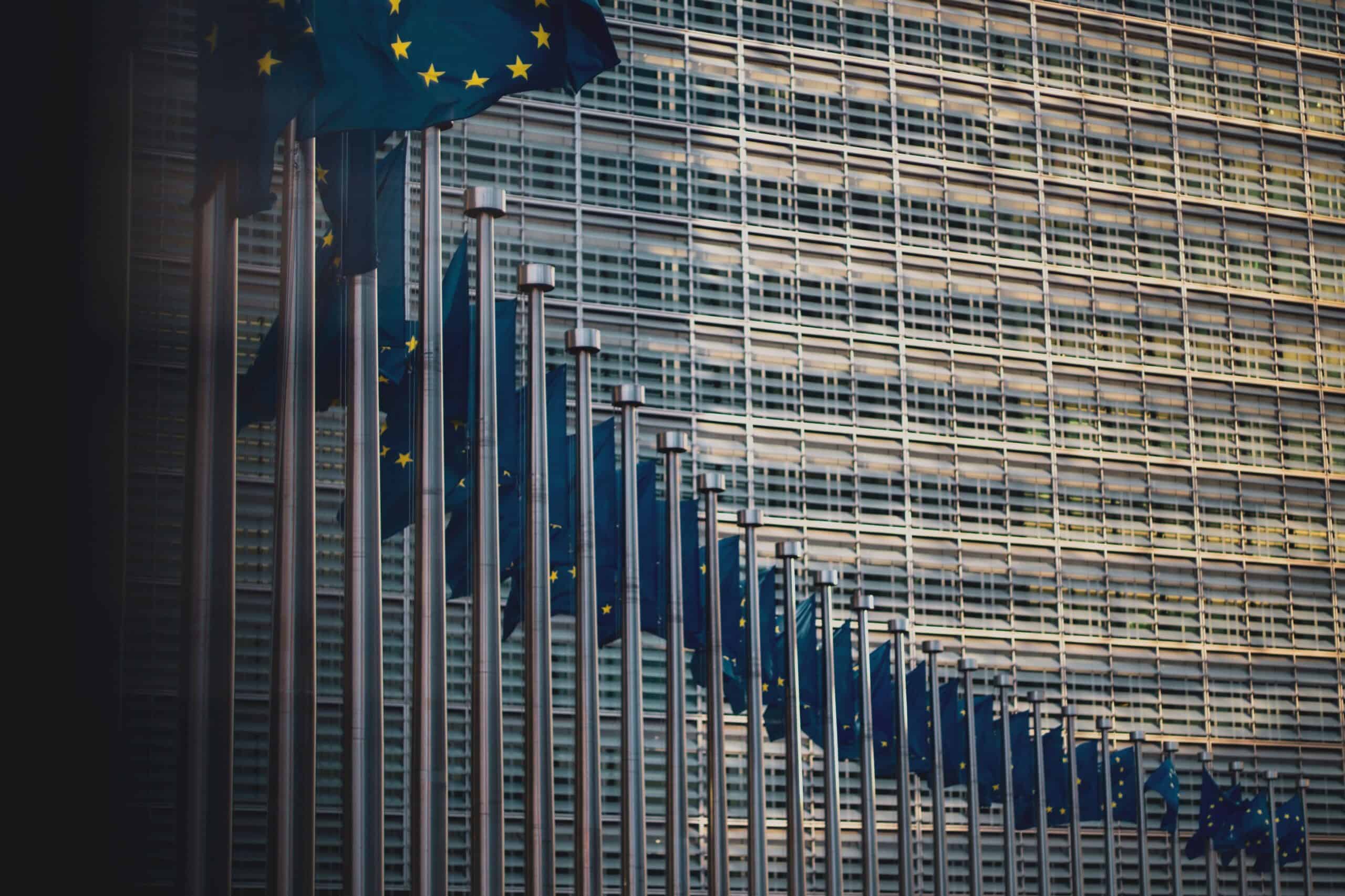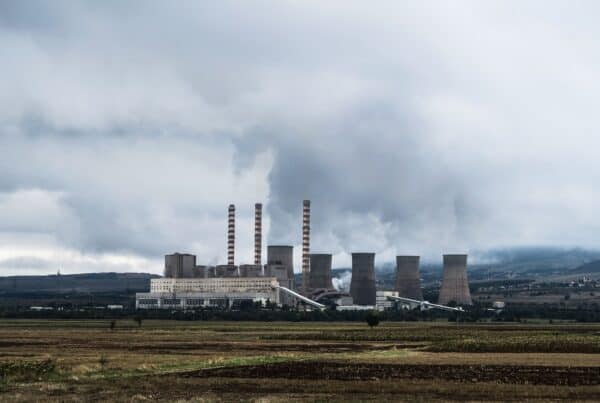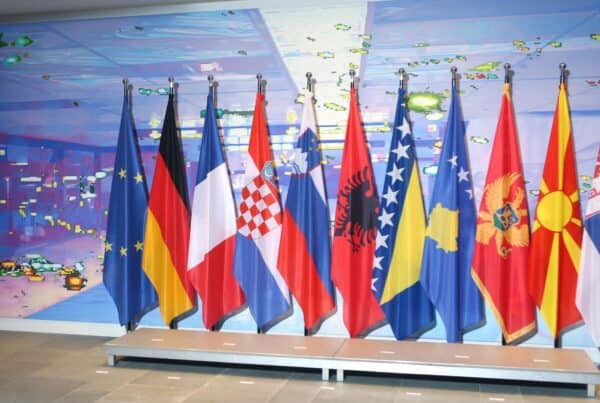In this final third part we will analyse European initiatives put in place to address environmental issues in the Western Balkans. Particularly, we will go through EU financial instruments, EU implementation plans and finally European territorial cooperation.
You can read the previous Part 2 here.
European financial instruments
EU instruments to strengthen socio-economic transformation in the region include the Instrument for Pre-accession Assistance – IPA III[1] covering Albania, Bosnia and Herzegovina, Kosovo, Montenegro, North Macedonia, Serbia and Turkey. In addition to strengthening conditionality on democracy, human rights and the rule of law, IPA III also includes efforts to support areas such as economic recovery, transport, energy, and the achievement of climate and environmental protection goals (including the strengthening of relevant legislation)[2].
The new IPA III instruments support the implementation of the Economic and Investment Plan for the Western Balkans[3] (2020), a nine-billion-euro plan to finance investments capable (also as a result of Covid-19) of supporting and strengthening the region towards a green transition, as well as the digital transition, introducing the necessary reforms and stimulating the creation of a more sustainable European market[4].
Specifically, the Plan envisages ten areas of investment: mobility (road and rail), energy transition by overcoming the use of coal, incentives for public and private construction to reduce greenhouse gas emissions and improve energy efficiency, waste management and the development of broadband infrastructure, as well as investments to strengthen the competitiveness and innovation of the private sector (in relation to SMEs and young people)[5].
The countries of the Western Balkans can also access the Green Economy Financing Facility (GEFF)[6] of the European Bank for Reconstruction and Development (EBRD), which offers financing to invest in energy efficiency through technology and interventions in the private/residential and business/business sectors. The facility is implemented by the Regional Energy Efficiency Programme for the Western Balkans (REEP Plus)[7], with contributions from donors such as the European Union, the Western Balkan Investment Framework and the Austrian Federal Ministry of Finance. The credit line for the Western Balkan countries amounts to EUR 85 million (of which EUR 22 million for Bosnia and Herzegovina).
Together with the Investment Plan, the European Commission also presented the Green Agenda for the Western Balkans (GAWB)[8], which was subsequently adopted in 2020 through the Sofia Declaration on the Green Agenda for the Western Balkans[9] during the Western Balkans Sofia Summit, expressing a common alignment with the EU Green New Deal policy[10] and the goal of carbon neutrality in 2050.
Implementing the green transition
In 2021, the Green Agenda Action Plan was agreed to implement reforms aimed at combating climate-environmental change and regional integration[11]. As shown in Figure 1 below, it consists of three main parts (1: Action plan for the implementation; 2: Roadmaps for the implementation; and 3) Governance and reporting). More specifically, the first part of the Action Plan consists of five chapters:
- decarbonisation through the reduction of greenhouse gas emissions and the use of renewable energies, starting with the harmonisation of EU Emissions Trading System in 2014;
- circular economy, with the development from 2023 of strategies aimed at waste management, waste separation and sustainable consumption;
- de-pollution, starting with the ratification of the Geneva Convention on Long-range Transboundary Air Pollution[12] from 2025 and the identification of strategies to improve air quality;
- sustainable agriculture by setting food safety standards and promoting organic farming from 2026; and
- nature protection and biodiversity, setting up monitoring and reporting centres with the objective of developing new plans to restore biodiversity.
Figure 1: Table of contents of the Action Plan
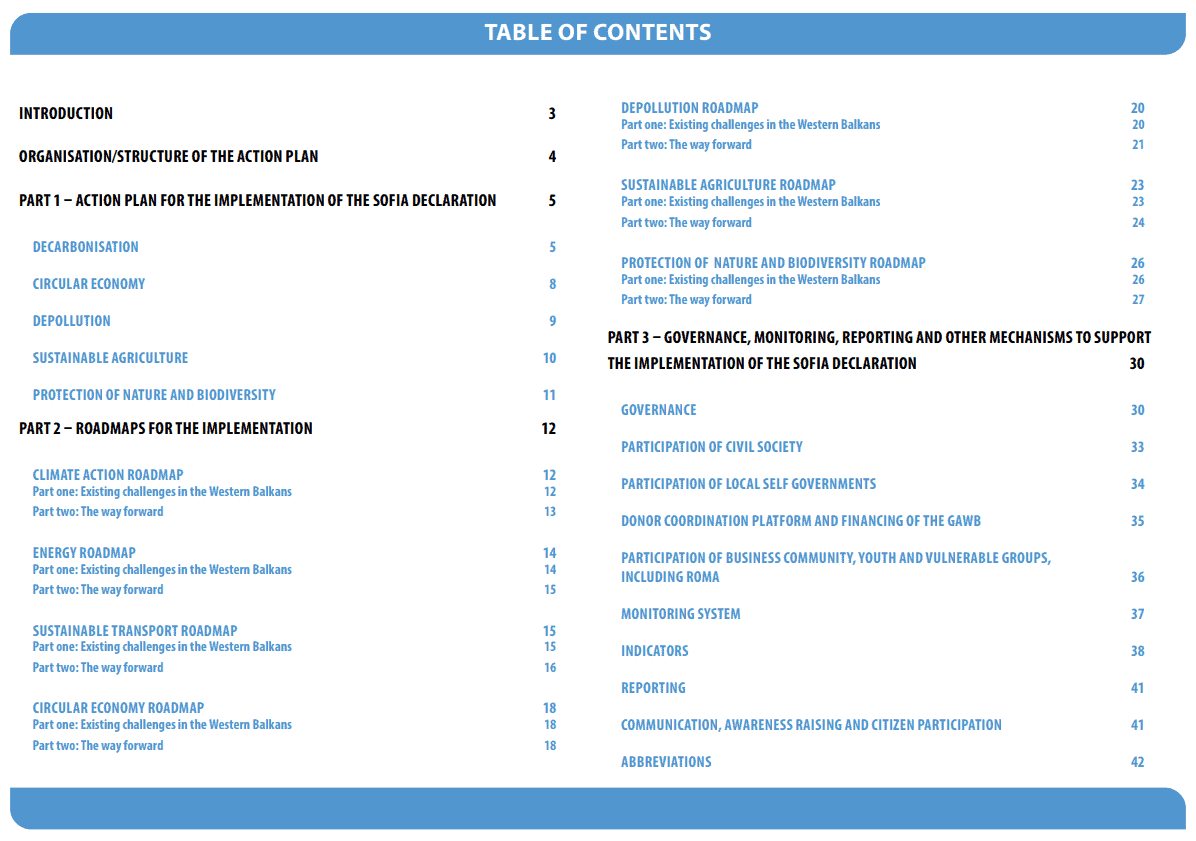 Source: Action Plan for the Implementation of the Sofia Declaration on the Green Agenda for the Western Balkans 2021-2030, p. 2
Source: Action Plan for the Implementation of the Sofia Declaration on the Green Agenda for the Western Balkans 2021-2030, p. 2
As with other initiatives, digitisation is also identified as an enabling factor, in line with the green and digital transition approach.
Some of the caveats raised by an Aspen Institute study (Implementing the Green Agenda for the Western Balkans, December 2021[13]) highlight the need to strengthen awareness of the goals and impacts of the Green Agenda engagement among governments and public institutions in the Western Balkans. Green transition and decarbonisation are more easily perceived as an obligation imposed by the European Union, rather than an opportunity to strengthen their societies and economies with long-term strategic visions.
The implementation of the decarbonisation process itself should assess the real feasibility of certain measures and the regulatory and monitoring capacity of the institutions in charge. Countries should also consider measures to mitigate the social costs of the ecological transition, foreseeing possible spill-over effects in terms of vulnerability.
On the other hand, a public letter[14] from twenty-four civil society organisations (Balkan and non-Balkan) welcomed the Green Agenda initiative, raising some concerns in terms of the lack of inclusiveness and transparency of the process. In particular, they criticise the lack of public participation in the design of the Agenda and the failure to capitalise on the input of those few organisations that were consulted. It also highlights the risk of short-term investments taking precedence over the goals of the Green Deal.
In addition, little attention is paid to making the planned commitments binding, and more resources are requested for civil society organisations in order for them to be able to raise public awareness and ensure serious control over the spending of funds.
With reference to anti-pollution, among the initiatives mentioned in the document “Commission Staff Working Document – Guidelines for the Implementation of the Green Agenda for the Western Balkans”[15] there are:
- Assisting the region in the development and implementation of air quality strategies;
- Increasing the adoption of best available techniques in line with the European Directive on industrial emissions (Directive 2010/75/EU);
- Accreditation of air quality monitoring networks;
- Include the region in pan-European networks supporting clean-up initiatives, e.g. Forum on Air Quality Modelling (FAIRMODE) & Network of Air Quality Reference Laboratories (AQUILA);
- Support regional and/or bilateral agreements and/or protocols on transboundary water pollution and land-based sources of pollution;
- Support the Western Balkans to use and contribute to the potential of programmes such as the European Earth Observation programme-Copernicus[16] and Destination Earth[17].
The funding instruments of the ambitious Green Agenda for the Western Balkans programme are diverse. One part concerns the endowment from the EU Multiannual Financial Framework (MFF, 2021-2027) which, however, will also require the intervention of private finance. Funds from the beneficiary and member countries will have to be mobilised. The Instrument for Pre-accession (IPA) III contains a part dedicated to the implementation of the Green Agenda. Green financing will originate from the Green for Growth Fund (GGF), a public-private partnership, while the Regional Energy Efficiency Programme (REEP) can be used on the energy front. A large amount of support will then be provided by the Western Balkans Guarantee Facility[18], with an endowment of nine billion euro in grants and twenty billion euro in investments.
On the basis of the drafted Action Plan[19] (October 2021), 58 measures have been indicated for the region (5 specifically related to improving air quality, in the de-pollution chapter – see Figure 2 below).
Figure 2: Depollution chapter of the Action Plan
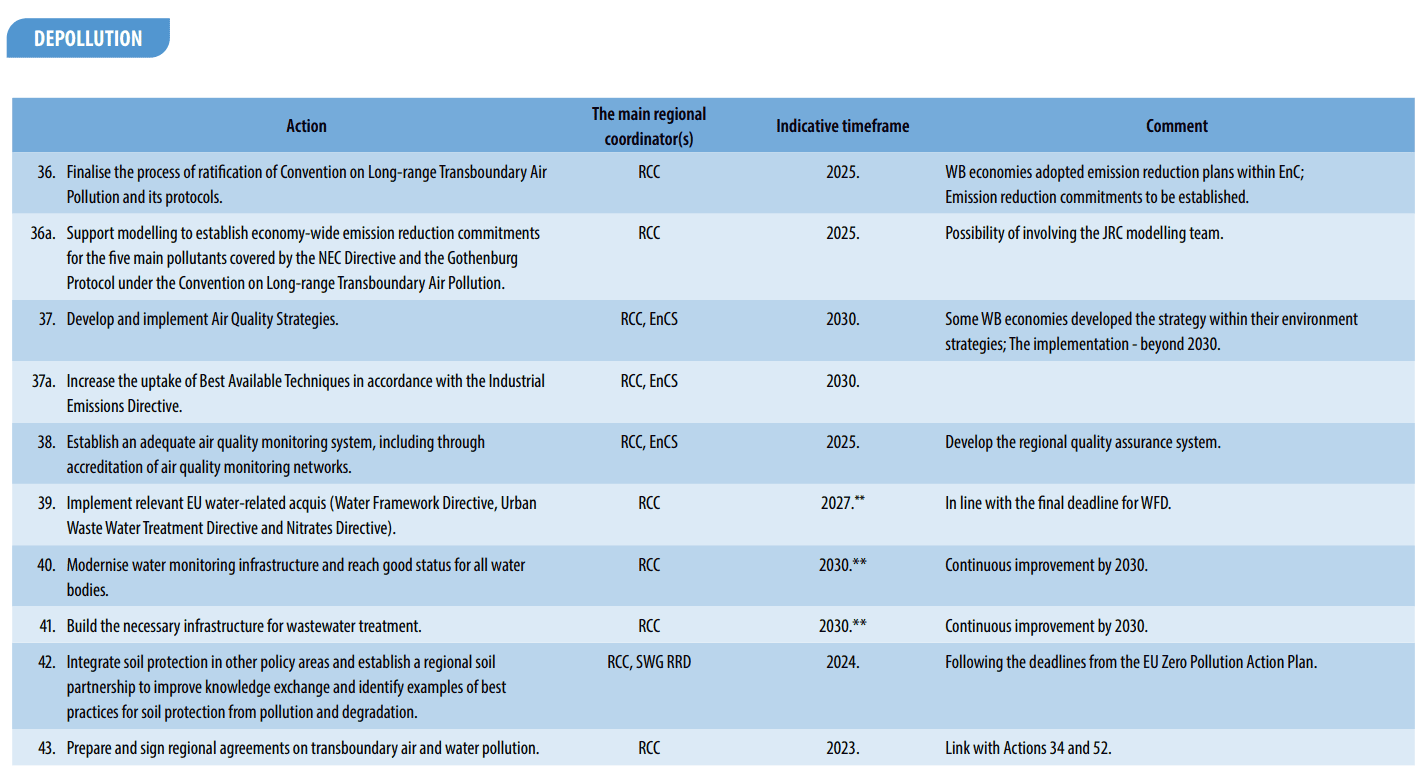 Source: Action Plan for the Implementation of the Sofia Declaration on the Green Agenda for the Western Balkans 2021-2030, p. 9
Source: Action Plan for the Implementation of the Sofia Declaration on the Green Agenda for the Western Balkans 2021-2030, p. 9
The different chapters provided a road map offering strategic orientation to the different Balkan countries to start the process initiated by the Sofia Declaration, such that air pollution can be tackled through preventive and remedial actions, reinforcing the regulatory framework.
Based on the roadmap, the reduction of emissions from large combustion plants should continue, as it has started since 2018 in some Western Balkan countries in accordance to the minimum requirements of the Industrial Emissions Directive (IED). National air pollution control and monitoring programmes (including the installation of new air monitoring stations, laboratories for analysis and dedicated IT models and tools) should be developed to ensure that the National Emission Reduction Commitments (NEC) Directive is fully implemented. Stricter emission standards for vehicles, small industries and sectors not covered by the NEC should be introduced. Additionally, enforcement of existing legislation on surveillance and compliance checks should be encouraged and the relevant control bodies strengthened.
In order to facilitate the implementation of the Sofia Declaration in the Green Agenda, a governance mechanism based on concerted action and dialogue (permanent, at the operational level and with annual ministerial meetings), a multi-actor approach, cross-sectoral collaborations and the involvement of the Balkan authorities through various platforms have been envisaged (See Figure 3 below). One in particular, the ‘NGO Forum’, concerns civil society organisations that are called upon to formulate inputs and recommendations, which are then forwarded to RCC and the authorities involved. Additionally, to play an initial role in monitoring the process and increasing citizen involvement and environmental awareness, a list of 50 non-governmental organisations was drawn up, being open to subsequent additions[20].
Figure 3: Cooperation platform
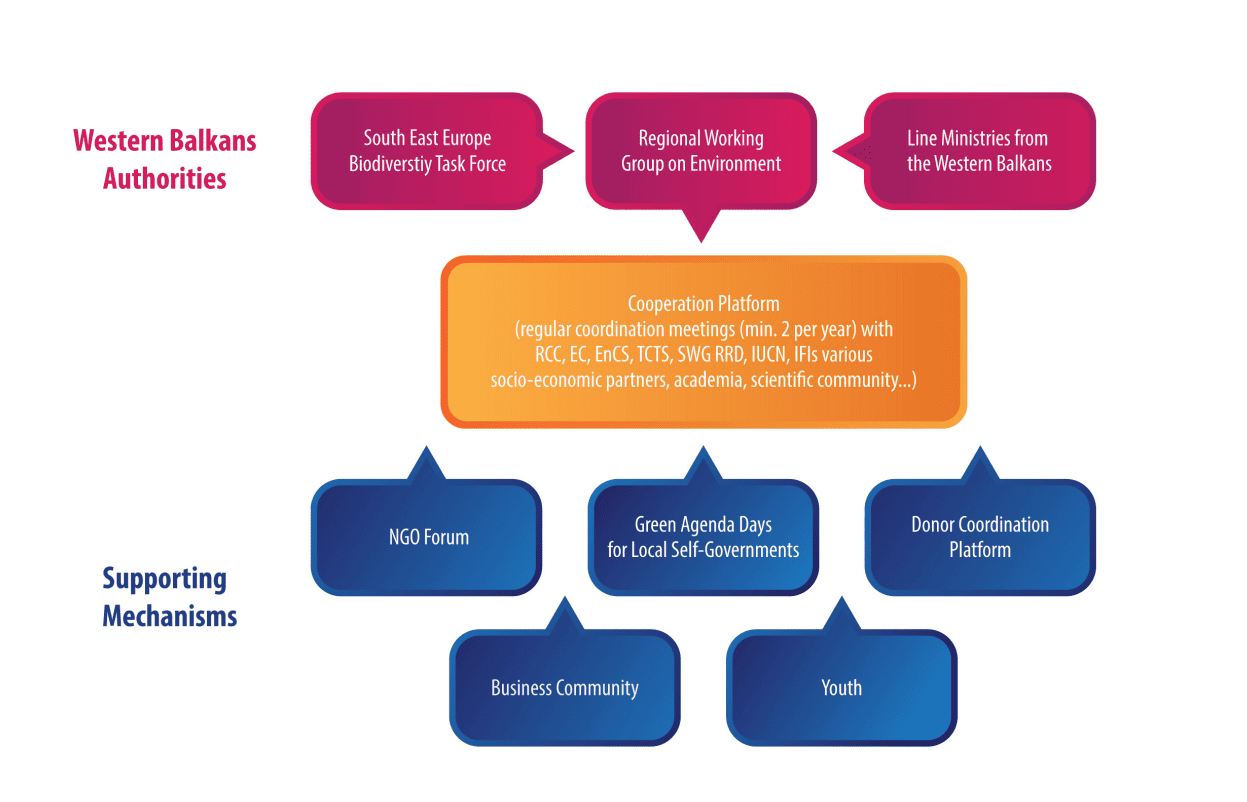 Source: Action Plan for the Implementation of the Sofia Declaration on the Green Agenda for the Western Balkans 2021-2030, p. 32
Source: Action Plan for the Implementation of the Sofia Declaration on the Green Agenda for the Western Balkans 2021-2030, p. 32
However, the operational document (Action Plan) again provoked a controversial reaction from Balkan civil society organisations, which criticised the weakness of the European Commission’s and RCC’s consultation process in the formulation of the Action Plan, which replicated the mistake already made for the Guidelines in opening up to external involvement only briefly and in the final phase of re-reading. In particular it is raised that: “Bottom-up implies that input was collected before drafting and that various actors were consulted on successive drafts. But what happened in reality was that after taking nearly a year to draft the Action Plan – and providing no information about it in the meantime – the RCC allowed just one week for civil society organisations to comment on the draft”[21].
European Territorial Cooperation
European Territorial Cooperation (ETC)[22] is one of the interventions provided by the European Union to strengthen the economic and social cohesion of territories and reduce the gap between the development levels of different regions. Through ETC, different territories from different countries share experiences and practical solutions to common problems. European Territorial Cooperation is financed by the European Regional Development Fund (ERDF) and is divided into cross-border, transnational and interregional.
Transnational cooperation supports technological innovation, environment and risk prevention, mobility, sustainable urban development (e.g., the Adrion programme). Interregional cooperation (Interreg Europe) covers the entire European territory and concerns two themes in particular, innovation and the knowledge economy and environment and risk prevention. The ETC also refers to the Espon, Interact and Urbact programmes, managed directly by the European Commission, which support the development of actions linked to the main operational programmes of territorial cooperation.
Some projects financed by the different programmes are called ‘flagship projects’[23] by the Agency for Territorial Cohesion (ATC). These are projects financed by the ETC or groups of projects (clusters) that focus on the same theme and have produced real changes in the territories involved.
References
- https://ec.europa.eu/commission/presscorner/detail/en/IP_21_4730 ↑
- https://europeanwesternbalkans.com/2021/06/03/european-parliament-and-council-reach-agreement-on-e14-billion-ipa-iii/ ↑
- https://ec.europa.eu/commission/presscorner/detail/en/ip_20_1811 ↑
- https://ec.europa.eu/commission/presscorner/detail/en/IP_21_4730 ↑
- https://ec.europa.eu/commission/presscorner/detail/en/ip_20_1811 ↑
- https://ebrdgeff.com/ba/the-programme/the-facility/ ↑
- https://www.ebrd.com/work-with-us/projects/tcpsd/16400.html ↑
- https://neighbourhood-enlargement.ec.europa.eu/system/files/2020-10/green_agenda_for_the_western_balkans_en.pdf ↑
- https://www.rcc.int/docs/546/sofia-declaration-on-the-green-agenda-for-the-western-balkans-rn ↑
- https://commission.europa.eu/strategy-and-policy/priorities-2019-2024/european-green-deal_en ↑
- https://ec.europa.eu/commission/presscorner/detail/en/ip_20_1811 ↑
- https://eur-lex.europa.eu/legal-content/EN/TXT/?uri=LEGISSUM%3Al28162 ↑
- https://www.aspeninstitute.de/wp-content/uploads/2021_Aspen-Germany_Implementing-the-Green-Agenda-for-the-WB.pdf ↑
- https://eeb.org/wp-content/uploads/2020/12/Green-Agenda-Summit-Civil-Society-Statement-09Nov2020-003.pdf ↑
- https://neighbourhood-enlargement.ec.europa.eu/guidelines-implementation-green-agenda-western-balkans_en ↑
- https://www.copernicus.eu/en ↑
- https://www.ecmwf.int/en/about/what-we-do/environmental-services-and-future-vision/destination-earth ↑
- http://www.wbedif.eu/for-entrepreneurs/guarantee-facility/ ↑
- https://www.rcc.int/docs/596/action-plan-for-the-implementation-of-the-sofia-declaration-on-the-green-agenda-for-the-western-%20balkans-2021-2030 ↑
- https://www.rcc.int/docs/596/action-plan-for-the-implementation-of-the-sofia-declaration-on-the-green-agenda-for-the-western-balkans-2021-2030 ↑
- https://bankwatch.org/blog/the-western-balkans-green-agenda-action-plan-quantity-over-quality ↑
- https://www.europarl.europa.eu/factsheets/en/sheet/98/european-territorial-cooperation ↑
- https://www.europarl.europa.eu/factsheets/en/sheet/98/european-territorial-cooperation ↑

